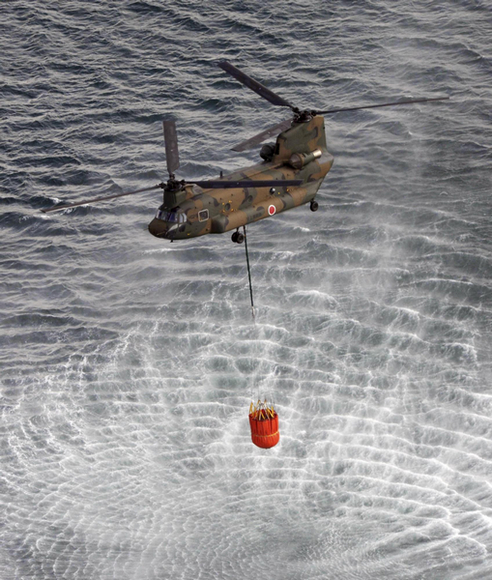Photos
Japan begins air drop on stricken reactor
Updated: 2011-03-17 14:21
(Agencies)
|
|
US officials in Washington, meanwhile, warned that the Fukushima Dai-ichi plant in northeastern Japan may be on the verge of spewing more radioactive material because water was gone from a storage pool that keeps spent nuclear fuel rods from overheating.
A Japanese military CH-47 Chinook helicopter began dumping seawater on the damaged reactor of Unit 3 at the Fukushima complex at 9:48 am, said defense ministry spokeswoman Kazumi Toyama. The aircraft dumped at least four loads on the reactor, though much of the water appeared to be dispersed in the wind.
At least a dozen more loads were planned in the 40 minutes that each crew can operate before switching to limit radiation exposure, the ministry said.
The dumping was intended both to help cool the reactor and to replenish water in a pool holding spent fuel rods, Toyama said. The plant's owner, Tokyo Electric Power Co, said earlier that the pool was nearly empty, which might cause the rods to overheat.
The comments from US officials indicated there were similar problems at another unit of the Dai-ichi complex.
US Nuclear Regulatory Commission Chairman Gregory Jaczko said at a congressional hearing in Washington that all the water was gone from a separate spent fuel pool at the plant's Unit 4. Japanese officials expressed similar worries about that unit, but that it was impossible to be sure of its status.
Emergency workers were forced to retreat from the plant Wednesday when radiation levels soared, losing precious time. They resumed work after radiation levels dropped, but much of the monitoring equipment in the plant is inoperable, complicating efforts to assess the situation.
"We are afraid that the water level at unit 4 is the lowest," said Hikaru Kuroda, facilities management official at Tokyo Electric Power Co. But he added, "Because we cannot get near it, the only way to monitor the situation is visually from far away."
E-paper

Factory fever
Despite auto manufacturing bubble scare, car giants gear up expansion of factories.
Preview of the coming issue
Dressed for success
Fabric of change
Specials

Earthquake Hits Japan
A massive 8.8 magnitude quake hit the northeast coast of Japan on March 11,2011.

NPC & CPPCC sessions
Lawmakers and political advisers gather in Beijing to discuss major issues.

Slide: Japan quake
Devastating earthquake and tsunami left millions without water, electricity, homes or heat.




